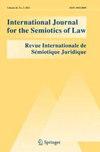编辑器的介绍
IF 0.9
Q3 SOCIAL SCIENCES, INTERDISCIPLINARY
INTERNATIONAL JOURNAL FOR THE SEMIOTICS OF LAW-REVUE INTERNATIONALE DE SEMIOTIQUE JURIDIQUE
Pub Date : 2019-12-31
DOI:10.1080/08935696.2021.1935582
引用次数: 0
摘要
这个问题提供了一个强有力的、广泛的与商品化和异化力量的接触,以及对干预和政治参与的不同努力。本文的贡献——有时将这些主题交织在一起,有时将它们解开或打结——包括一次图书研讨会、三篇单独提交的论文、两篇书评,以及一次关于该杂志前主编之一David Ruccio的公共学者工作的特别研讨会。本期文章从David F.Ruccio和Kenan Erçel关于Ruccio影响深远的长期博客《经济学、文化和社会的偶然链接与评论》的充满活力的对话开始。该博客部分源于鲁乔对应对2009年危机的渴望,他称之为第二次大萧条,它使鲁乔作为圣母大学经济学教师多年来一直在课堂上推广的教学方法得以扩展。自那以后,该博客已经产生了10000条帖子和近130万的浏览量。这是一个公共教育项目,旨在颠覆常识性的想法和类别,为新的可能性和需求开辟空间。Erçel和Ruccio思考了博客及其发展的历史背景,思考了课堂教学和博客对话类型之间的差异。他们比较了学术工作的限制和博客所产生的对比自由,特别是作为一种通过各种文本形式产生和交流临时的、新兴的想法的手段(这里最值得注意的可能是鲁乔对漫画的广泛使用),并讨论了质疑当前连词特征的重要性和挑战。鲁乔州,“当代资本主义的怪诞特征——其淫秽的不平等、其在造成全球变暖中的作用、对工人阶级的持续惩罚和惩罚、其系统性种族主义,以及最近新型冠状病毒大流行病的不平等条件和后果,以及抵抗和建立新乌托邦愿景的例子,构成了原始材料erials。。。至少对我来说,这将使博客成为一个无情批评的项目。”该研讨会由Erçel编辑,邀请了一系列撰稿人——Ruccio的学生、对话者和同事——他们扩展了采访中产生的见解,并强调了每个撰稿人的主题干预,《重塑马克思主义》,2021年第33卷,第3期,329-334,https://doi.org/10.1080/08935696.2021.1935582本文章由计算机程序翻译,如有差异,请以英文原文为准。
Editors Introduction
This issue offers a robust, wide-ranging encounter with the forces of commodification and alienation, with different efforts toward intervention and political engagement. The contributions herein—sometimes weaving these themes together, sometimes unraveling or knotting them up—include a book symposium, three individually submitted essays, two book reviews, and a special symposium on the public-scholar work of one of the journal’s former chief editors, David Ruccio. The issue begins with David F. Ruccio and Kenan Erçel’s vibrant conversation about Ruccio’s impactful, long-running blog, Occasional Links & Commentary on Economics, Culture and Society. The blog emerged in part from Ruccio’s desire to respond to the 2009 crisis, what he refers to as the Second Great Depression, and it has enabled an expansion of the pedagogical approach Ruccio had been advancing in the classroom for years as a teacher of economics at the University of Notre Dame. The blog has since generated 10,000 posts and nearly 1.3 million views. It is a public-education project intended to upend common-sense ideas and categories and to open spaces for new possibilities and demands. Reflecting on both the blog and the historical context in which it has developed, Erçel and Ruccio think through differences between classroom teaching and the types of conversations that can take place through a blog. They compare the constraints of academic work and the contrasting freedoms that the blog engenders—in particular, as a means to produce and communicate provisional, emergent ideas through a wide range of textual forms (perhaps most notable here is Ruccio’s extensive use of cartoons)—and they discuss the importance and the challenges of interrogating the features of the current conjuncture. States Ruccio, “the grotesque features of contemporary capitalism—its obscene inequalities, its role in creating global warming, the continued disciplining and punishing of the working classes, its systemic racism, and most recently the unequal conditions and consequences of the novel coronavirus pandemic—as well as the instances of resistance and the forging of new utopian visions, constitute the raw materials ... that, at least for me, keep the blog relevant as a project of ruthless criticism.” The symposium, edited by Erçel, feautures a range of contributors—Ruccio’s students, interlocutors, and colleagues—who extend the insights generated in the interview and highlight the thematic interventions that for each contributor RETHINKING MARXISM, 2021 Vol. 33, No. 3, 329–334, https://doi.org/10.1080/08935696.2021.1935582
求助全文
通过发布文献求助,成功后即可免费获取论文全文。
去求助
来源期刊

INTERNATIONAL JOURNAL FOR THE SEMIOTICS OF LAW-REVUE INTERNATIONALE DE SEMIOTIQUE JURIDIQUE
SOCIAL SCIENCES, INTERDISCIPLINARY-
CiteScore
2.00
自引率
25.00%
发文量
71
期刊介绍:
The International Journal for the Semiotics of Law is the leading international journal in Legal Semiotics worldwide. We are pathfinders in mapping the contours of Legal Semiotics. We provide a high quality blind peer-reviewing process to all the papers via our online submission platform with well-established expert reviewers from all over the world. Our boards reflect this vision and mission. We welcome submissions in English or in French. We bridge different fields of expertise to allow a percolation of experience and a sharing of this advanced knowledge from individual, collective and/or institutional fields of competence. We publish original and high quality papers that should ideally critique, apply or otherwise engage with semiotics or related theory and models of analyses, or with rhetoric, history of political and legal discourses, philosophy of language, pragmatics, sociolinguistics, deconstruction and all types of semiotics analyses including visual semiotics. We also welcome submissions, which reflect on legal philosophy or legal theory, hermeneutics, the relation between psychoanalysis and language, the intersection between law and literature, as well as the relation between law and aesthetics. We encourage researchers to submit proposals for Special Issues so as to promote their research projects. Submissions should be sent to the EIC. We aim at publishing Online First to decrease publication delays, and give the possibility to select Open Choice. Our goal is to identify, promote and publish interdisciplinary and innovative research papers in legal semiotics.
 求助内容:
求助内容: 应助结果提醒方式:
应助结果提醒方式:


